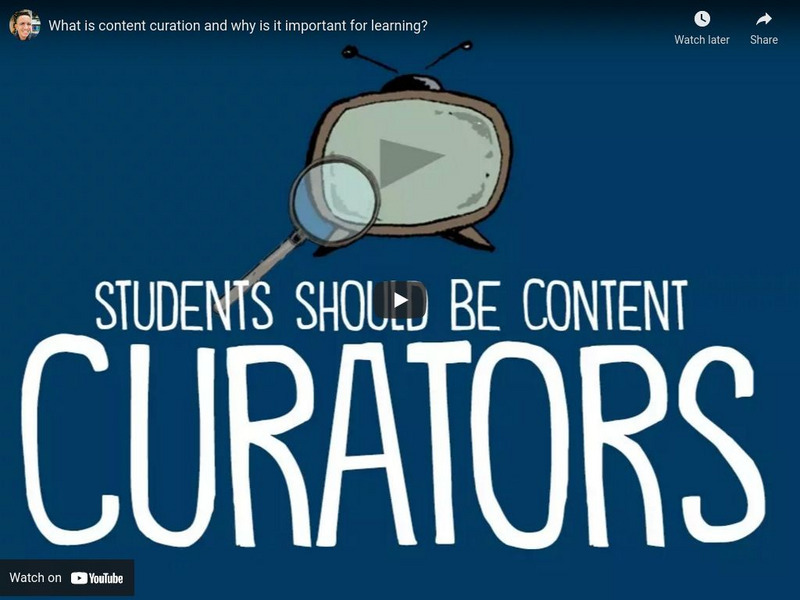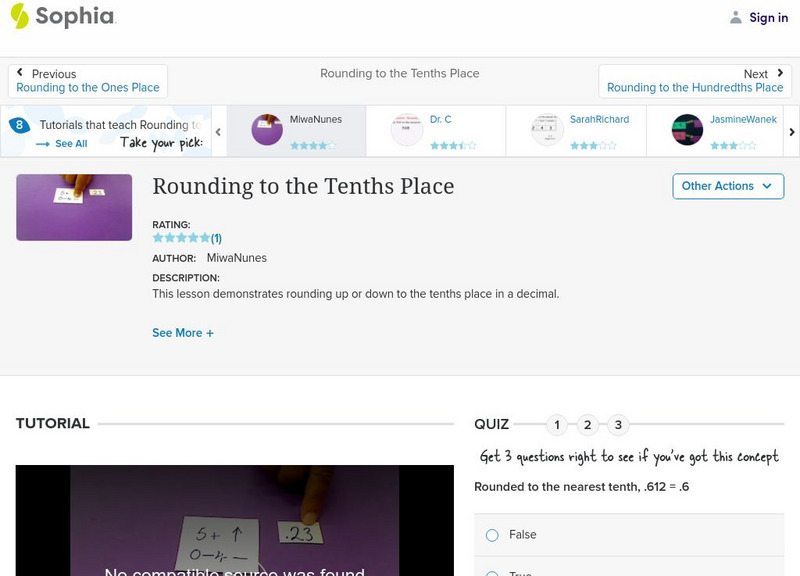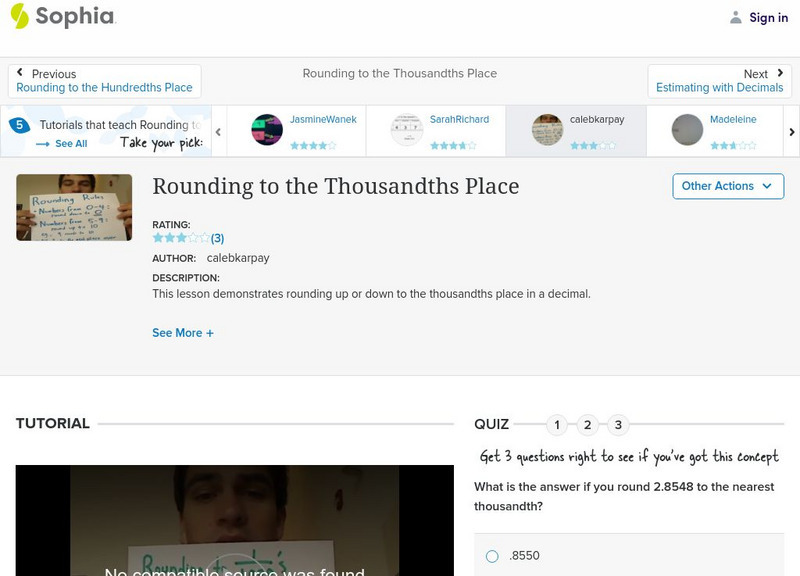Hi, what do you want to do?
Khan Academy
Khan Academy: Subtraction by Breaking Apart
Solve 2 and 3-digit subtraction problems by breaking apart the numbers by place value.
Khan Academy
Khan Academy: Rounding to Nearest 10 and 100
Learn to round up to 4-digit numbers to the nearest ten and hundred.
PBS
Pbs Learning Media: Zombies and Calculus, Part 2
Learn about tangent vectors in this video (5:54) from NOVA Digital. In this hypothetical world, zombies always move straight toward humans. This means that the tangent vector of a zombie's path points at the intended target. However,...
PBS
Pbs Learning Media: Zombies and Calculus, Part 1
Learn about the math behind predator-prey population cycles in this video [4:28] from NOVA Digital. In this example, zombie and human populations fluctuate. The zombie population increases as zombies convert humans into zombies. However,...
PBS
Pbs Learning Media: Unladylike2020: Collection
The Unladylike2020 Collection honors the centennial of women's suffrage. These digital resources present the rich history of 26 little-known Progressive Era women, diverse in profession, race, ethnicity, geographical and class...
PBS
Pbs Learning Media: Frontline: One Boy's Online Tragedy
While some people turn to social networks and texting as an opportunity to open up and be themselves, others are looking for targets. In this video segment from FRONTLINE: "Digital Nation," learn about Ryan Halligan, the victim of a...
PBS
Pbs Learning Media: Nova: Addiction: Vaping Cost One Teen His Health and Dreams
Meet Cade, a high school hockey player, and learn how his addiction to nicotine from vaping has had physical and behavioral impacts on his life in this digital video from NOVA. Use this resource to stimulate thinking and questions about...
Khan Academy
Khan Academy: A Cyber Privacy Parable
A video reviewing over cyber privacy by introducing you to a story about Tim. Learn about Tim's trials and tribulations as he maneuvers through a digital threat. [3:28]
Sophia Learning
Sophia: Rationalizing Denominators
In this lesson, students will learn Rationalizing Denominators
Other
Media Education Lab: The Cost of Copyright Confusion for Media Literacy
Presents research on how confusing perceptions of copyright law can adversely affect media literacy educators and their students. (5m39s)
Other
Youtube: Safety Center Community Guidelines
This resource explains how to increase your safety on YouTube, online with methods for handling online harassment. Includes sections devoted to teens, cyberbullying and suicide prevention.
Other
Western Reserve Public Media: Teaching With Tech: Tech Plus Crayons
The lesson consists of students working in groups of 3-4 to research different topics about Emperor Penguins. They will scan a QR code, which will take them to teacher-vetted websites for answers to topic questions. These topics are:...
Khan Academy
Khan Academy: Color Grading (Video)
In this video [1:53] we'll explore what goes on during the color grading process.
Science Friday Initiative
Science Friday: Art Meets Geek in Toni Dove's Studio
Toni Dove employs infrared motion-sensing, voice recognition software, 3-D mechanical projection screens, video puppets, and lots of other tech to bring her mixed media productions to life. [4:30]
Planet Nutshell
Planet Nutshell: Net Safe: Be Kind Online! (K 3)
In the real world and online it's important to treat others like you want to be treated. How do we act when we are on the Internet? This video talks about good manners when we are on the Internet, things like using good words, not rude...
Other
John Spencer: Students Should Be Content Curators
Find out why students should be curators of content. [1:21]
Other
Western Reserve Public Media: Power Words (Youngstown City School District)
In this modeled lesson, second graders work in groups to create "video dictionaries," using a tablet and an app. Students complete graphic organizers then find images online to illustrate their words. They write their own sentences,...
Imagine Learning Classroom
Learn Zillion: Generate Research Questions
In this lesson, you will learn how to generate burning questions to guide your research by asking, What do I want to know more about? [4:31]
Sophia Learning
Sophia: Rounding to the Tenths Place: Lesson 5
This lesson demonstrates rounding up or down to the tenths place in a decimal. It is 5 of 11 in the series titled "Rounding to the Tenths Place."
Sophia Learning
Sophia: Rounding to the Thousandths Place: Lesson 10
This lesson demonstrates rounding up or down to the thousandths place in a decimal. It is 10 of 10 in the series titled "Rounding to the Thousandths Place."
Other
It's Okay to Be Smart: Why Vaccines Work
A history of vaccines and how they work to eliminate disease is given in this video. [7:22]
Math Mammoth
Math Mammoth: Sums With 9: Addition Facts Lesson
A lesson on the addition facts where the sum is 9. Includes some drills, a word problem, and problems comparing a sum to a number. [5:36]
Other
It's Okay to Be Smart: Why Does February Only Have 28 Days?
Learn about the history of the development of the calendar and how February got the amount of dates it does in this video. Video reviews over the reasoning behind the calendar made by the Romans. [4:46]
Crash Course
Crash Course Games #5: The First Home Consoles
Crash Course video teaches us about the first home consoles that came out in the 1970s through Atari and Mattel. [7:22]
Other popular searches
- Digital Storytelling
- Digital Photography
- Digital Clock
- Digital Media
- Digital Imaging
- Digital Art
- Digital Microscope
- Digital Video Camera
- Digital Self Portraits
- Digital and Analog Clocks
- Netiquette
- Digital Cameras





















